Related Research Articles

The Church of Jesus Christ of Latter-day Saints, informally known as the LDS Church or Mormon Church, is the largest Latter Day Saint denomination. Founded by Joseph Smith during the Second Great Awakening, the church is headquartered in Salt Lake City, Utah, and has established congregations and built temples worldwide. According to the church, as of 2023, it has over 17.2 million members of which over 6.8 million live in the U.S. The church also reports over 99,000 volunteer missionaries and 350 temples.
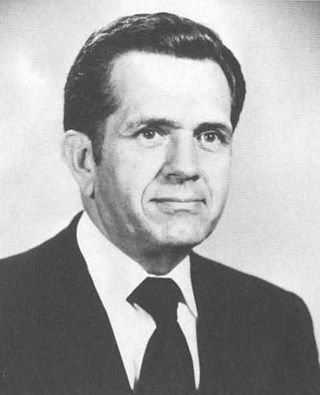
Boyd Kenneth Packer was an American religious leader and educator who served as president of the Quorum of the Twelve Apostles of the Church of Jesus Christ of Latter-day Saints from 2008 until his death. He also served as the quorum's acting president from 1994 to 2008 and was an apostle and member of the Quorum of the Twelve from 1970 until his death. He served as a general authority of the church from 1961 until his death.
The September Six were six members of the Church of Jesus Christ of Latter-day Saints who were excommunicated or disfellowshipped by the church in September 1993, allegedly for publishing scholarly work against or criticizing church doctrine or leadership. The term "September Six" was coined by The Salt Lake Tribune and was used in the media and subsequent discussion. The church's action was referred to by some as evidence of an anti-intellectual posture on the part of church leadership.

Russell Marion Nelson Sr. is an American religious leader and retired surgeon who is the 17th and current president of the Church of Jesus Christ of Latter-day Saints. Nelson was a member of the LDS Church's Quorum of the Twelve Apostles for nearly 34 years, and was the quorum president from 2015 to 2018. As church president, Nelson is recognized by the church as a prophet, seer, and revelator.
Lavina Fielding Anderson was a Latter-day Saint scholar, writer, editor, and feminist. Anderson held a PhD in English from the University of Washington.
Grant Hart Palmer spent thirty-four years in the LDS Church Education System, teaching institute and seminary, and served as a chaplain at the Salt Lake County jail for thirteen years. In 2002 Signature Books published Grant’s book, An Insider’s View of Mormon Origins, in which Grant scrutinized many of Mormonism’s foundational stories. Grant went on to publish two additional books, The Incomparable Christ in 2005, and Restoring Christ: Leaving Mormon Jesus for Jesus of the Gospels.
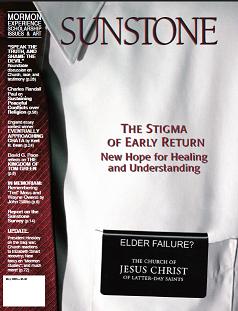
Sunstone is a magazine published by the Sunstone Education Foundation, Inc., a 501(c)(3) nonprofit corporation, that discusses Mormonism through scholarship, art, short fiction, and poetry. The foundation began the publication in 1974. The magazine's motto is Faith Seeking Understanding.
The basic beliefs and traditions of the Church of Jesus Christ of Latter-day Saints have a cultural impact that distinguishes church members, practices and activities. The culture is geographically concentrated in the Mormon Corridor in the United States, and is present to a lesser extent in many places of the world where Latter-day Saints live.
Teachings on Sexuality in the Church of Jesus Christ of Latter-day Saints is deeply rooted in its doctrine. In its standards for sexual behavior called the law of chastity, top LDS leaders bar all premarital sex, all homosexual sexual activity, the viewing of pornography, masturbation, overtly sexual kissing, sexual dancing, and sexual touch outside of a heterosexual marriage. LDS Leaders teach that gender is defined in premortal life, and that part of the purpose of mortal life is for men and women to be sealed together in heterosexual marriages, progress eternally after death as gods together, and produce spiritual children in the afterlife. The church states that sexual relations within the framework of monogamous opposite-sex marriage are healthy, necessary, and approved by God. The LDS denomination of Mormonism places great emphasis on the sexual behavior of Mormon adherents, as a commitment to follow the law of chastity is required for baptism, adherence is required to receive a temple recommend, and is part of the temple endowment ceremony covenants devout participants promise by oath to keep.

All homosexual sexual activity is condemned as sinful by the Church of Jesus Christ of Latter-day Saints in its law of chastity, and the church teaches that God does not approve of same-sex marriage. Adherents who participate in same-sex sexual behavior may face church discipline. Members of the church who experience homosexual attractions, including those who self-identify as gay, lesbian, or bisexual remain in good standing in the church if they abstain from same-sex marriage and any homosexual sexual activity or sexual relationships outside an opposite-sex marriage. However, all people, including those in same-sex relationships and marriages, are permitted to attend the weekly Sunday meetings.
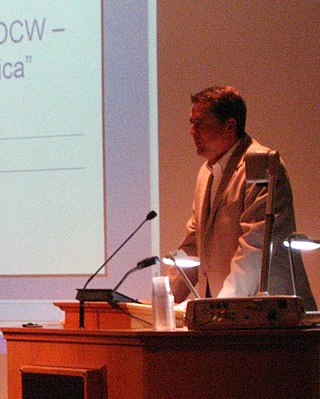
John Parkinson Dehlin is an American podcast host. He holds a PhD in psychology. Dehlin founded the Mormon Stories Podcast, as well as several other podcasts, blogs, and websites. He was an influential early participant in the "Mormon blogosphere," and blogs at Patheos.com. He advocates for LGBT rights and other views outside mainstream religious culture. In January 2015, Dehlin was excommunicated from the Church of Jesus Christ of Latter-day Saints.
Stay LDS / Mormon is a collaborative blog featuring discussion and commentary about Mormon issues, beliefs, culture, thought and current events. It was created by Brian Johnston and John Dehlin, formerly of the Sunstone Education Foundation.

Mormon Stories Podcast is a podcast principally hosted by psychologist John Dehlin featuring interviews with individuals and occasionally scholars on Mormon topics. The podcasts are noted as a platform for individuals critical of the Church of Jesus Christ of Latter-day Saints, skeptic and dissident individuals.
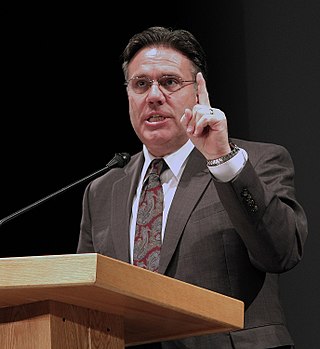
Bradley Ray Wilcox is a professor of ancient scripture at Brigham Young University (BYU) and has been a counselor in the Young Men general presidency of the Church of Jesus Christ of Latter-day Saints since April 2020.
Peggy Fletcher Stack is an American journalist, editor, and author. Stack has been the lead religion writer for The Salt Lake Tribune since 1991. She and five other journalists at the Salt Lake Tribune won the 2017 Pulitzer Prize for Local Reporting. She won the Cornell Award for Excellence in Religion Reporting—Mid-sized Newspapers from the Religious News Association in 2004, 2012, 2017, 2018, and 2022.
Denver Carlos Snuffer Jr. is a Utah lawyer, an author of Restorationist devotional books, a lecturer, a speculative theologian, and claims to be a “revelator to fellowships of the remnants movement,” a spiritual movement in schism with the Church of Jesus Christ of Latter-day Saints. The movement has a few thousand adherents, many of them members or former members of the LDS Church. He was excommunicated by the LDS Church in 2013 for refusing to cease publication of his 2011 book, Passing the Heavenly Gift which challenges many points of LDS orthodoxy. He subsequently has been identified as a prophet by many, and several of his teachings have been canonized as scripture.

Remnant fellowships are a loosely organized branch of the Latter Day Saint movement formed by individuals who accept alleged divine revelations received by Denver Snuffer Jr.. The Remnant Fellowships generally feel called to personal and social renewal preparatory to Christ's eventual second coming. According to movement beliefs, participants anticipate a coming time when remnants remain within the full restored covenant with Jesus Christ: an allusion to a belief that "The Bible, Book of Mormon, and modern revelation through the Prophet Joseph Smith, prophesy that the gospel of Jesus Christ would shift from the Gentile stewards of the gospel back to Israel in the last days." The movement places a renewed focus on individual communion with God, gifts of the spirit, tangible expressions of faith, and the eventual establishment of Zion. While the movement has no official name, the term "Snufferite" has been used to denote followers. Other designations include covenant of Christ movement and Denver Snuffer movement. Participants sometimes reference each other as "covenant Brother," "covenant Sister".
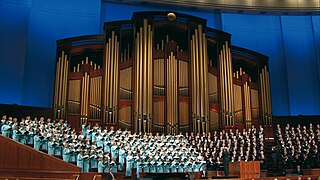
General Conference is a gathering of members of the Church of Jesus Christ of Latter-day Saints, held biannually every April and October at the Conference Center in Salt Lake City, Utah. During each conference, church members gather in a series of two-hour sessions to listen to the faith's leaders.

The Church of Jesus Christ of Latter-day Saints has been involved with many pieces of legislation relating to LGBT people and their rights. These include playing an important role in defeating same-sex marriage legalization in Hawaii, Alaska, Nebraska, Nevada, California, and Utah. The topic of same-sex marriage has been one of the church's foremost public concerns since 1993. Leaders have stated that it will become involved in political matters if it perceives that there is a moral issue at stake and wields considerable influence on a national level. Over a dozen members of the US congress had membership in the church in the early 2000s. About 80% of Utah state lawmakers identied as Mormon at that time as well. The church's political involvement around LGBT rights has long been a source of controversy both within and outside the church. It's also been a significant cause of disagreement and disaffection by members.
This is a timeline of LGBT Mormon history in the 2010s, part of a series of timelines consisting of events, publications, and speeches about LGBTQ+ individuals, topics around sexual orientation and gender minorities, and the community of members of the Church of Jesus Christ of Latter-day Saints.
References
- Gregory, Sophronia Scott (June 13, 1994). "Saints Preserve Us: The Mormons are likely to choose another aged, ailing leader, but nevertheless their church is thriving". Time . Vol. 143, no. 24.
- Religious News Service (August 13, 1992). "Mormon church said to be keeping files on dissenters". The Times-News . Hendersonville, North Carolina. pp. 5B.
- Steinfels, Peter (August 22, 1992). "Secret Files". New York Times .
- The First Presidency (August 22, 1992). "First Presidency statement cites scriptural mandate for Church committee". Church News . p. 7.
- Brinkley-Rogers, Paul (October 10, 1993). "Cracks in the Temple: Mormon unity in peril". Arizona Republic .